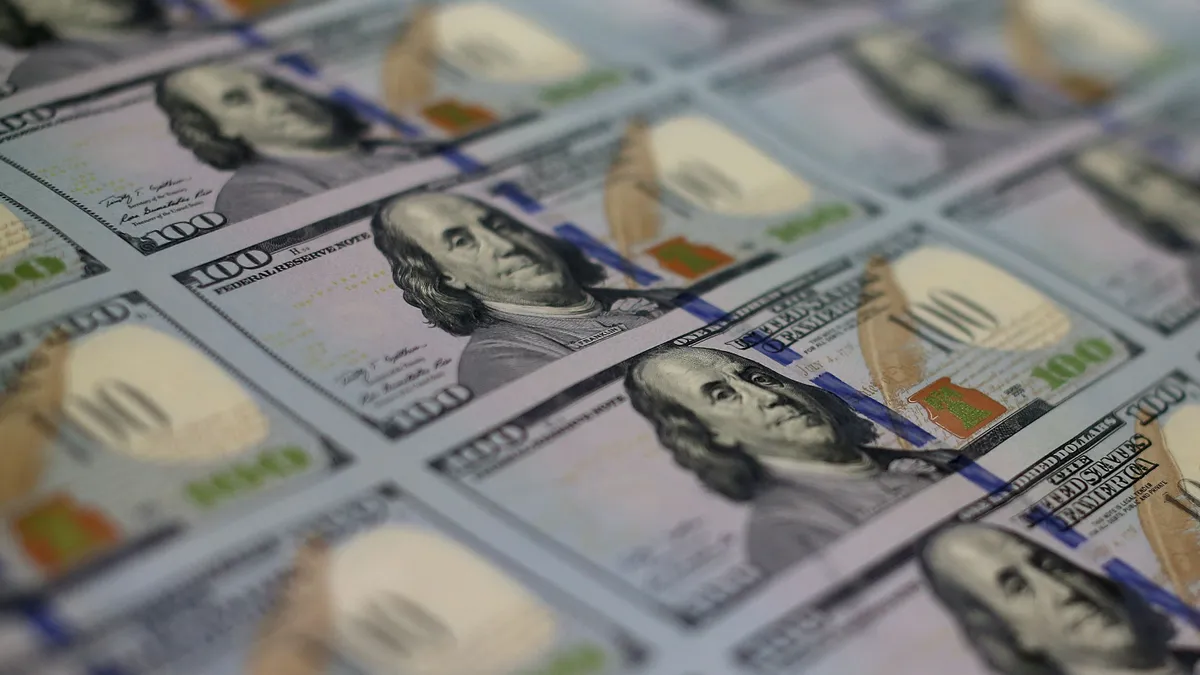Dive Brief:
- The Small Business Administration (SBA) paid $4.5 billion more than it should have when it disbursed Economic Injury Disaster Loan (EIDL) grants to small businesses amid the start of the pandemic last year, the agency’s inspector general said in a report released Thursday.
- The program, which was aimed at helping small businesses stay afloat amid COVID-19-related lockdowns, gave eligible businesses $1,000 per employee, with a cap of $10,000. The SBA, however, did not require sole proprietors or independent contractors to disclose employer identification numbers (EINs) when applying for the grants, and asked for Social Security numbers instead.
- "We found SBA did not establish a proper internal control environment at the onset of the program to prevent sole proprietors and independent contractors without employees from receiving Emergency EIDL grants for more than $1,000," Hannibal Ware, the SBA’s inspector general, wrote in the report. "SBA provided billions of dollars more in Emergency EIDL grants to sole proprietors and independent contractors than they were entitled to receive under SBA’s own policy."
Dive Insight:
The IG report claims the SBA approved thousands of grant amounts for applications that were not sufficiently vetted because it had no system of controls in place to flag applications with flawed or illogical information.
"The funding could have been used to provide grants to more eligible small businesses, which was the intent of SBA’s policy of limiting grants to $1,000 per employee," Ware wrote.
The agency’s inspector general said it found instances where sole proprietors or independent contractors improperly claimed to have as many as 1 million employees.
"The absence of an EIN and the number of employees cited on these applications should have alerted SBA loan specialists that the applicant’s self-certified information was flawed and likely erroneous," Ware wrote in the report. "However, SBA never requested additional information from these sole proprietors to verify the number of employees cited on their grant applications before approving and disbursing the grants in amounts in excess of $1,000."
Ware concluded EIDL applicants were eligible for only $704 million of the $5.2 billion they received through the program.
The SBA said it disagreed with some "key assertions," in a response that was included in the report.
In accordance with the CARES Act, the agency was required to accept self-certifications from applicants, wrote James Rivera, head of the SBA’s office of disaster resistance.
Rivera said the SBA also did not accept the Trump administration’s policy to limit EIDL Advances to $1,000 per employee up to the maximum of $10,000.
"The per-employee cap on the original EIDL Advance program was a self-imposed policy instituted by the prior Administration which has generated countless hours of work for SBA teams responding to inquiries from small businesses negatively impacted by the policy," he wrote.
Rivera also said unclear instructions may have led to some borrowers including employee Social Security numbers rather than EINs on applications.
"The draft report asserts that all sole proprietors and independent contractors that reported having employees on their COVID EIDL application applied using only their SSN because they did not have an EIN and are therefore in violation of an IRS regulation to obtain an EIN," he wrote. "This assertion, however, fails to acknowledge that the COVID EIDL application instructions may have been unclear to applicants."
Despite disagreeing with "key assertions" in the report, Rivera said the SBA partially agrees with the audit recommendation.
"SBA will develop a plan to assess the EIDL Advances awarded by reviewing a sampling of recipient sole proprietors and independent contractors that self-certified having employees but did not provide an EIN on their COVID EIDL application," he wrote.
The agency will employ a third-party contractor to conduct the assessment of EIDL Advances greater than $1,000 disbursed to sole proprietors and independent contractors that did not apply using an EIN, Rivera wrote.
The agency will also develop a plan to remedy cases in which the applicant provided false information on an application with regard to having employees, he added.
"SBA will explore available options to remedy cases, including but not limited to recovery of funds by offset, referral to OIG criminal investigative division, or the provision of supporting documentation, where appropriate," he wrote.
Another setback
Thursday's IG report is the latest black mark for the SBA, which has been front and center in the government's economic relief efforts amid the pandemic.
The agency’s inspector general in July called for closer oversight of the EIDL program, warning banks to investigate suspicious activity related to it.
Thursday’s report will likely stoke more pushback from bank trade groups and Republican lawmakers who have criticized the agency’s handling of direct lending through the program.
Critics of the agency have said the recent launch of a direct forgiveness portal for Paycheck Protection Program (PPP) loans is an attempt to regain control of the lending program.
"I think this move by the SBA to try to get some control back of the PPP program, when it was actually run very well through the banks, might be an effort to retain their turf," Rep. Jim Hagedorn, R-MN, said last month. He accused the SBA of threatening to audit banks that refused to opt in to the SBA’s direct forgiveness portal in favor of their own platforms.











